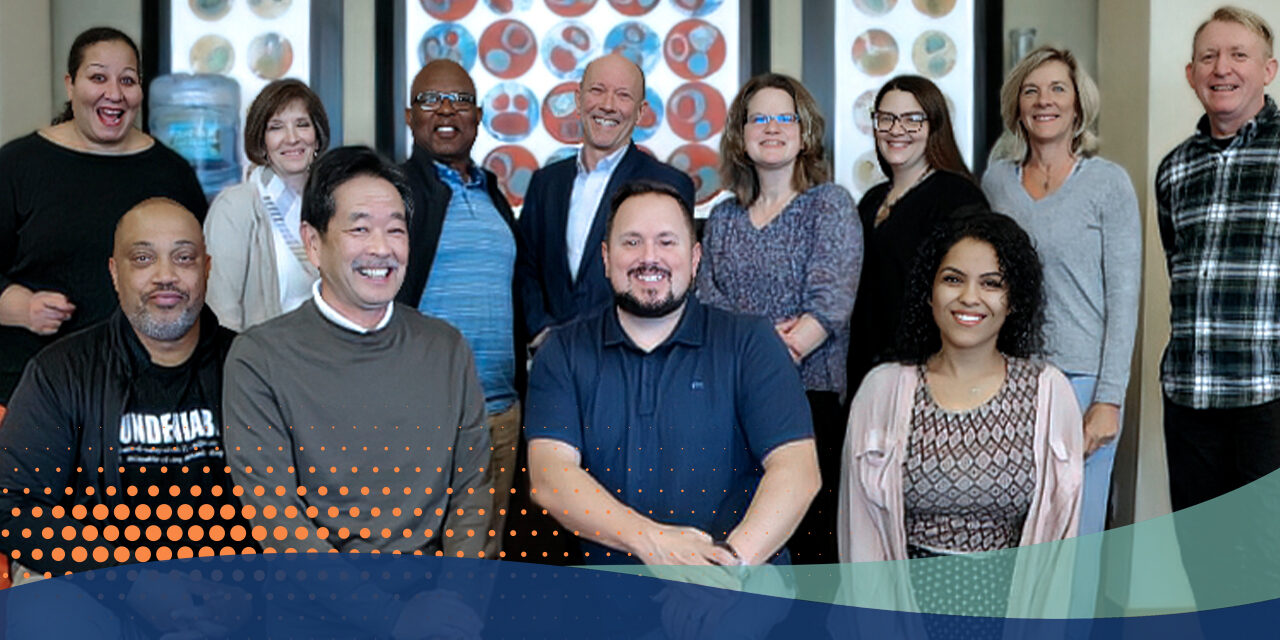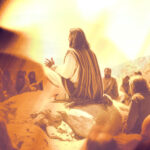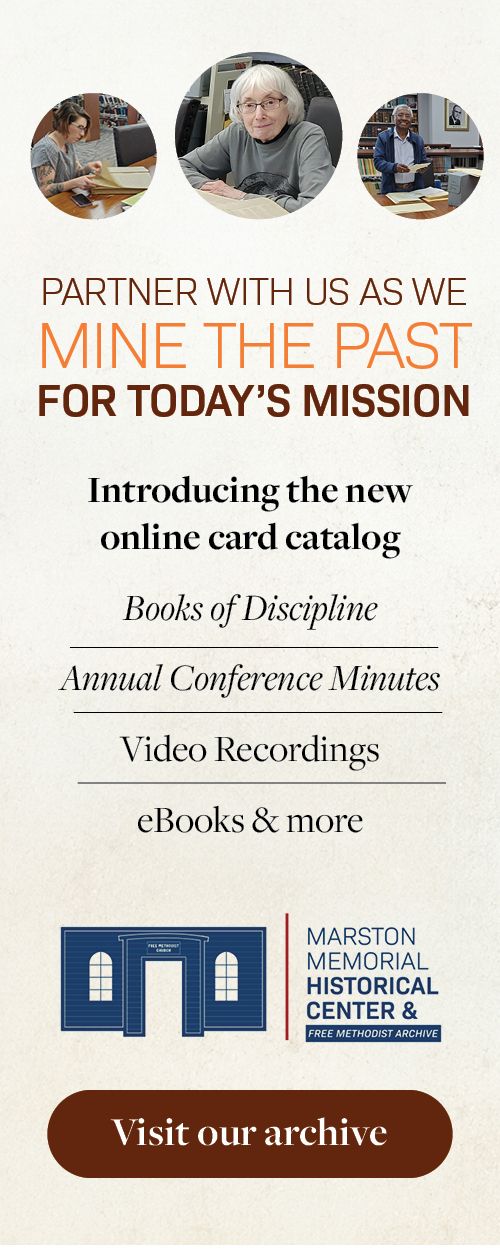The Bishops Search Committee has the challenging task of presenting the Board of Administration with a slate of nominees from which Free Methodist bishops will be elected by General Conference 2023 delegates.
“In the Free Methodist Church USA, we have three bishops, and they’re elected for a four-year term,” said Bishop Emeritus David Roller, who is co-chairing the committee with Anna Alexandra (Alex) Soto, as he and Soto were interviewed by Brett Heintzman on a new episode of “The Light + Life Podcast.” “Any ordained person within the Free Methodist Church is available to be nominated as a candidate for bishop, but as you can imagine, there are thousands of these people.”
Without a nomination process, Roller said, the most well-known people typically became bishop until a few decades ago when “this process began of asking a group of people to thoughtfully and prayerfully consider all the elders of the church, and then to present to the church the people that we felt the Holy Spirit was indicating had the gifts and graces for this work.”
Beginning online in the summer of 2021, the Bishops Search Committee “started the process with prayer,” Soto said, “to make sure there is a spirit of discernment and clarity for the work that we’ve been tasked to do. … It was very helpful for us to meet and dedicate the time to prayer, and not address the business work until we were face to face with each other.”
Committee members had their first in-person meeting late last year.
Qualifications and Characteristics
Soto said the committee has wrestled with the question of what unique qualifications are needed for someone to serve as a bishop.
“Foundational characteristics that we’re looking at for nominees are spiritual maturity, commitment to values, apostolic commission, executive leadership, and personal character,” said Soto, who noted the committee also is looking for kairos characteristics, which are “qualities that correspond to the pressing needs of the denomination.”
Heintzman asked about some of the characteristics that some Free Methodists may not know how to define.
Apostolic commission is “demonstrating the ability to see God’s future for the church and lead in that direction,” Soto explained.
“Ephesians talks about a gift, which God gives to the church, of people with the gift of being an apostle,” Roller added. “Any ordained elder is eligible to be nominated for the office of bishop, but not everyone — and, in fact, most ordained elders — will not have this gift of apostle.”
An apostle has a broader scope of ministry than overseeing a local church.
“A bishop of the Free Methodist Church USA is going to have a scope of a significant swath of the country,” said Roller, who added that the apostolic gift “seems to be related to fruitfulness. … There is a blessing of God upon their ministry, which results in a lot of fruit.”
Spiritual maturity is “characterized by integrity, holiness, wisdom and faith, commitment to values expressed in theological understanding of an advocacy for our positions, freedoms and priorities as articulated in The Free Methodist Way,” Soto said. Executive leadership is “demonstrated in the ability to work well with superintendents and area directors in leadership and multiplication within a complex organization, personal character exhibited, and leadership that is grace-filled, courageous, self-aware and inspiring. These are not light asks of a candidate.”
Global Responsibilities
Free Methodist Church USA bishops also oversee the church in some areas outside the United States. They work to raise up new leaders with the goal of a separate general conference forming, but that is not always a fast process.
“One of the marvelous things about being a part of the Free Methodist Church USA is that we are connected all around the world to ministries,” Roller said. “Some of those ministries are fully developed and have their own bishops, but many of those ministries are still developing and are still under the oversight of the USA church.”
Soto said a bishop’s responsibility for an international area is “the equivalent of an annual conference responsibility.”
Some Free Methodists might question the time the bishops spend outside the United States, but Roller said, “There are great benefits to the USA church of being globally connected. It really is kind of a cross-fertilization built into our system, where bishops are able to participate in what God is doing around the world.”
Committee Members
The committee was organized by the national Board of Administration with a reflection of the church’s scope of ethnicity, race, gender, geography, ministerial status, and age.
“There’s a benefit to having good representation across the country, and across gender and cultural lines,” Soto said.
Along with Soto and Roller, the committee includes Gloria Girgis (Southern Michigan Conference), Ron Yorizane (Pacific Coast Japanese), Julie Durbin (Harvest), Mike Wilson (Reach), Jan Coleman (New South), Derrick Shields (South East Region), Melinda Matzdorff (River), Charles Latchison (Southern California), Mindi Grieser Cromwell (Great Plains), Al Sones (Acts 12:24) and John Lane (Wabash/New South).
“This really is a representative group of the church, but the real reason that every member of that committee is there is they are identified as a godly person who has a sense of the pulse of both the times in which we live and the richness of the Free Methodist Church [and] the needs,” Roller said. “It really is a good committee, and people are vocal. People participate.”
Roller emphasized that the committee doesn’t actually select the next bishops.
“We search for people, and then we present these nominees to the BOA,” Roller said. “We do not select the bishops. We simply present a slate of candidates via the BOA to the church for their consideration.”
The committee is currently accepting nominations.
“There is a form that is sent to each annual conference in which they could identify a nominee,” Soto said. “We identified that there was opportunity to cast that net wider and truly search, so we’ve opened it up to other individuals to have the possibility to submit nominees to this process.”
Click here for the link to the electronic nomination form. The committee can also be reached by email via BSC2023@fmcusa.org. (Nominations do not need to be made for the current bishops.)
“From there, we would do an evaluation of the candidates that we’re receiving, gather information from the nominees that were proposed to us, and give them an opportunity to also answer some questions and provide information for us. The team will then gather in October to review all of this information and go through the analysis process,” Soto said. “Ultimately, our job is to present the slate for nominees to the BOA in April of next year.”
Why search for new nominees if the three current bishops are not ready to leave their positions?
“The Book of Discipline says that every general conference, the Bishops Search Committee is required to submit at least two more names than the number of bishops currently serving,” Roller said. “Since we have three [bishops] right now, that means our committee is required to submit at least five names. Now it could be a lot more than that, but the Book of Discipline just talks about the minimum number.”
Click here for more of the conversation on “The Light + Life Podcast.” +









